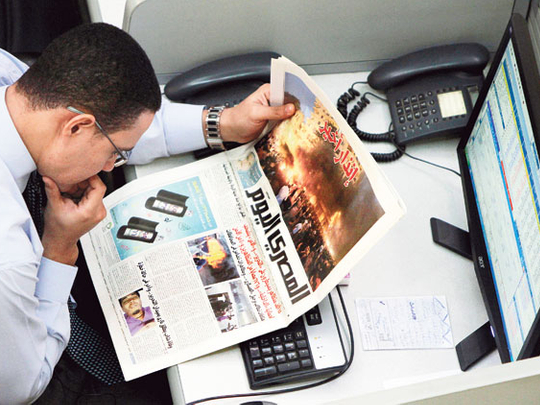
Dubai: Political turmoil across the Arab world rattled regional stock markets yesterday as Egypt experienced renewed violence and Kuwait enhanced measures to maintain public order.
Egypt's benchmark index slumped to a six-week low as violent battles flared across the country.
Brokers attributed the drop to the clashes between rock-throwing protesters and security forces in Cairo's iconic Tahrir Square, the epicentre of the uprising that deposed former President Hosni Mubarak in February.
The fighting had entered its second day, with the protesters demanding the country's military rulers quickly announce a date when they plan to hand over power to a civilian government.
The EGX 30 Index fell 2.4 per cent to 4,023.45, its lowest close since October 12. The bourse has lost 44 per cent of its value since the start of the year. Orascom Construction Industries, the country's biggest publicly traded builder, sank 3.2 per cent. EFG-Hermes Holding SAE, the biggest publicly traded Arab investment bank, dropped to its lowest in more than a month.
Security doubts
"The clashes are affecting the market very strongly," Hazem Choucri, a foreign institutional trader at Cairo-based AlembicHC, told Bloomberg. "Some people are wondering if the government will be able to provide security for the elections. Seeing as it was not able to deal with protesters in Tahrir Square, how will it deal with elections in the countryside?"
Khalid Naga, a senior broker with Mega Investments, said even after a thousands-strong demonstration on Friday went relatively peacefully, there were expectations that the market would decline.
"All things considered, this is a reasonable decline," said Naga. "We were expecting worse — maybe five per cent."
Foreign investment and tourism, which are two of Egypt's economic pillars, are reeling from the unrest, while frequent labour strikes and other mass protests have disrupted daily life and forced the government to adopt populist policies that have widened the deficit and added to expenses.
Already, Egypt has run through almost 40 per cent of its net international reserves since December.
Brokers said continued unrest in the capital would likely only add to the drop and expected the market's support point — where it could bounce back — could be around 3,800.
But hitting that level would involve a number of days of heavy losses and so far the Egyptian market has shown a surprising ability to bounce back despite the continuing unrest.
In the Gulf, Kuwait's bourse slipped 0.56 per cent to 5,825.20 after Shaikh Sabah Al Ahmad Al Sabah, the emir, ordered security forces to take all measures necessary to maintain public order.
The Dubai Financial Market (DFM) General Index fell 0.88 per cent to a three and a half week low of 1,366.90 and the Abu Dhabi Securities Exchange (ADX) fell the most since October 17, slipping 0.5 per cent to 2,461.17.
"UAE markets are taking the lead from negative international sentiment over the weekend related to Europe's debt," said Samer Darwish, an analyst at Gulfmena Investments in Dubai.
Elsewhere in the Gulf, Saudi Arabia's Tadawul All Share Index rose 0.13 per cent, Qatar's measure fell 0.46 per cent, Bahrain's bourse gained 1.23 per cent, and Muscat's exchange declined 0.4 per cent.
— With inputs from agencies












